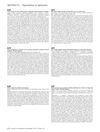 April 2018 in “bioRxiv (Cold Spring Harbor Laboratory)”
April 2018 in “bioRxiv (Cold Spring Harbor Laboratory)” A gene variant causes patched hair loss in mice, similar to alopecia areata in humans.
 1 citations,
July 2018 in “Elsevier eBooks”
1 citations,
July 2018 in “Elsevier eBooks” Heredity and hormones cause common hair loss, and topical minoxidil is the first recommended treatment.
 99 citations,
July 2017 in “Clinical Reviews in Allergy & Immunology”
99 citations,
July 2017 in “Clinical Reviews in Allergy & Immunology” New treatments for Alopecia Areata show promise but need to be more effective and affordable.
 3 citations,
September 2019 in “PLOS ONE”
3 citations,
September 2019 in “PLOS ONE” Genetic variations affect dutasteride treatment response for male pattern hair loss.
143 citations,
January 2007 in “The American Journal of Human Genetics” Certain genes on chromosomes 6, 10, 16, and 18 may increase the risk of alopecia areata.
10 citations,
January 2019 in “Indian Journal of Dermatology” Weekly azathioprine pulse is a better alternative to corticosteroids for treating alopecia areata due to fewer side effects.
 27 citations,
September 2014 in “JAMA dermatology”
27 citations,
September 2014 in “JAMA dermatology” Female donor to male recipient sex mismatch and positive ACA-IgG are key risk factors for vitiligo and alopecia areata in chronic GvHD patients.
 12 citations,
February 2021 in “Translational Psychiatry”
12 citations,
February 2021 in “Translational Psychiatry” Researchers found two new genetic variants linked to Alzheimer's disease.
 14 citations,
February 2017 in “Scientific Reports”
14 citations,
February 2017 in “Scientific Reports” Certain variations of the HDAC9 gene can increase or decrease stroke risk in the Chinese population.
 8 citations,
February 2022 in “Vascular Health and Risk Management”
8 citations,
February 2022 in “Vascular Health and Risk Management” Some skin conditions may increase the risk of heart disease, and understanding their connection could lead to better treatments.
 9 citations,
February 2022 in “Nature communications”
9 citations,
February 2022 in “Nature communications” Rare changes in the KRT82 gene are linked to a higher risk of Alopecia Areata.
 16 citations,
January 2013 in “Internal Medicine”
16 citations,
January 2013 in “Internal Medicine” Early hair whitening may indicate a higher risk of heart disease in young and middle-aged men.
 4 citations,
October 2018 in “International Braz J Urol”
4 citations,
October 2018 in “International Braz J Urol” Taking 5-alpha reductase inhibitors does not increase the risk of breast cancer in men.
 March 2018 in “Suez Canal University Medical Journal”
March 2018 in “Suez Canal University Medical Journal” NKG2D gene polymorphism doesn't affect SLE risk but may influence symptoms like rash and hair loss.
 24 citations,
January 2008 in “KARGER eBooks”
24 citations,
January 2008 in “KARGER eBooks” The document concludes that ongoing research using animal models is crucial for better understanding and treating Alopecia Areata.
 16 citations,
December 2001 in “Dermatologic Therapy”
16 citations,
December 2001 in “Dermatologic Therapy” Alopecia areata has a complex genetic basis that was not fully understood as of 2001.
 June 2017 in “Journal of clinical and investigative dermatology”
June 2017 in “Journal of clinical and investigative dermatology” Red blood cell folate levels are reliable indicators of long-term folate status in alopecia areata patients.
September 2017 in “The journal of investigative dermatology/Journal of investigative dermatology” Male-pattern baldness has a weak link to heart disease and some related health conditions.
 123 citations,
May 2020 in “Drug Development Research”
123 citations,
May 2020 in “Drug Development Research” Men's sensitivity to male hormones might affect how severe COVID-19 gets for them.
 April 2016 in “Journal of Investigative Dermatology”
April 2016 in “Journal of Investigative Dermatology” SOX4 is crucial for the development of melanoma.
 4 citations,
February 2022 in “Experimental Dermatology”
4 citations,
February 2022 in “Experimental Dermatology” Hair loss in men might be linked to changes in cell energy factories.
11 citations,
June 2015 in “Scientific Reports” The mtDNA N haplogroup is linked to a higher risk of late-onset lupus and specific symptoms in Han Chinese women.
 September 2020 in “Research Square (Research Square)”
September 2020 in “Research Square (Research Square)” Certain genes influence immunoglobulin levels in Chinese Holstein cows, which can improve calf health.
 29 citations,
March 2021 in “Frontiers in Endocrinology”
29 citations,
March 2021 in “Frontiers in Endocrinology” Testosterone may influence COVID-19 severity and outcomes.
 1341 citations,
January 2014 in “Cardiology Research and Practice”
1341 citations,
January 2014 in “Cardiology Research and Practice” Managing metabolic syndrome needs both lifestyle changes and medical treatments.
 20 citations,
June 2019 in “Experimental Dermatology”
20 citations,
June 2019 in “Experimental Dermatology” The research suggests that autophagy-related genes might play a role in causing alopecia areata.
 December 2017 in “Journal of Cosmetic Dermatology”
December 2017 in “Journal of Cosmetic Dermatology” Researchers found certain genes are overactive and others are underactive in men with early balding, which could help create new treatments.
 142 citations,
January 2019 in “Frontiers in Neuroendocrinology”
142 citations,
January 2019 in “Frontiers in Neuroendocrinology” Postpartum depression is linked to changes in brain chemicals, inflammation, stress, and certain genes, and can potentially be identified by markers like specific steroids, serotonin levels, and vitamin D levels.
 9 citations,
September 2015 in “Reproductive Biomedicine Online”
9 citations,
September 2015 in “Reproductive Biomedicine Online” Longer GGN repeats in the androgen receptor gene are linked to polycystic ovary syndrome.
 November 2004 in “John Wiley & Sons, Ltd eBooks”
November 2004 in “John Wiley & Sons, Ltd eBooks” Insulin resistance is linked to PCOS and can lead to other health issues, but treatments like metformin can help manage symptoms.


























